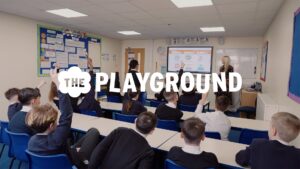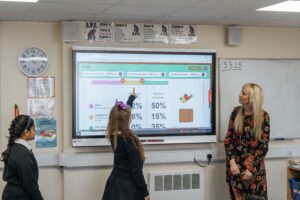Introducing The Playground

Carbon education suite will ‘gamify’ eco measures to give climate conscious pupils a voice during their school’s decarbonisation journey while having fun
Keep Britain Tidy’s Eco-Schools programme is setting out to transform climate education and inspire action across the UK’s educational estates with its innovative new online tool: ‘The Playground’.
Last year, the charity launched Count Your Carbon, a free comprehensive carbon calculator website designed for schools, colleges, and nurseries.
‘The Playground’ marks the next phase of its development – a completely new section of the website which will gamify carbon cutting actions live on screen, in real time.
It will enable teaching staff to explore the school’s carbon footprint with pupils, before giving them an active role in reducing emissions by applying hypothetical changes to their most recent carbon footprint calculation, such as adapting school policies, actions and infrastructure.

It will also allow staff and pupils to project the potential impact of their actions, and at the end of the process the pupils can take part in a vote, communicating to their school leaders where they think action should be prioritised.
The Playground has been developed with funding from Let’s Go Zero – a campaign by Ashden Climate Solutions, uniting schools, colleges and nurseries across the UK to be zero carbon’ and its release on April 22 coincides with Earth Day.
Keep Britain Tidy’s Chief Executive Allison Ogden-Newton OBE said: “We hope the launch of The Playground will inspire a deeper understanding of a school’s carbon footprint and how to reduce it, improving pupil’s climate literacy.
“The Playground isn’t just about crunching numbers; it’s a platform designed to empower climate-conscious decision-making for generations to come.
“Along with knowledge and insight from Let’s Go Zero’s Climate Action Advisors, we hope The Playground will help schools to build pupil voices into their Climate Action Plans.”
The Playground will cover six key areas of a school’s operations, allowing pupils to model the impact of a variety of actions, from introducing more plant-based meals, to reducing water usage, and encouraging more people to walk or wheel to school.
It can also be used as a teaching resource to help pupils discuss how schools can be more climate-conscious and inspire schools, teachers and students to think more about what they can do to reduce emissions.